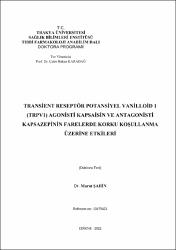Transient reseptör potansiyel vanilloid 1 (TRPV1) agonisti kapsaisin ve antagonisti kapsazepinin farelerde korku kuşallanma üzerine etkileri
Özet
Transient Reseptör Potansiyel Vanilloid 1 (TRPV1) kanalları hücre membranı
yerleşimli, içinde bir katyon kanalı bulunduran ve açıldığı zaman hücre içine kalsiyum girişine
neden olan bir kanaldır. Bu çalışmada TRPV1 agonisti kapsaisin ve antagonisti kapsazepin’in
korku koşullanma üzerine etkisinin araştırılması amaçlanmaktadır.
Çalışmada her grupta 10 hayvan olacak şekilde Balb/c türü toplam 300 adet fare
kullanıldı. Davranış deneylerinde deneklere gruplarına uygun olarak TRPV1 agonisti kapsaisin
(1 mg/kg, i.p.) veya TRPV1 antagonisti kapsazepin (1 mg/kg, i.p.) veya çözücü (1:1:8)
uygulandı. Tüm gruplara rota-rod performans testi bağlamsal korku koşullanma testi ve ipuçlu
korku koşullanma testi yapıldı.
Kapsaisin ve kapsazepin gerek bağlamsal gerek ipuçlu korku koşullanma testinde
öğrenme ve bellek sürecinin hiçbir aşamasında (edinim, konsolidasyon, geri çağırma, sönme ve
rekonsolidasyon) istatistiksel anlamlı bir değişiklik oluşturmadı. Elde ettiğimiz sonuçlar
kapsaisin ve kapsazepin’in ve dolayısı ile TRPV1 reseptörlerinin farelerde bağlamsal ve ipuçlu
korku koşullanma testi ile incelenen belleğin bazal durumu üzerine herhangi bir etkisi
olmadığını göstermektedir. Bununla birlikte, yapılan testlerin sağlıklı genç erişkin farelerde
gerçekleştirildiğinin mutlaka göz önünde bulundurulması gereklidir.
Elde ettiğimiz sonuçlar kapsaisin ve kapsazepin’in ve dolayısı ile TRPV1
reseptörlerinin farelerde bağlamsal ve ipuçlu korku koşullanma testi ile incelenen belleğin bazal
durumu üzerine herhangi bir etkisi olmadığını göstermektedir. In total 300 Balb/c mice were divided into 30 groups (n= 10 animals for each group). In
the behavioral experiments, the TRPV1 antagonist capsazepine (1 mg/kg, i.p.) or TRPV1
agonist capsaicin (1 mg/kg, i.p.) or solvent (1:1:8) were administered to subjects according to
their groups. Rota-rod performance test, contextual and cued fear conditioning test were
performed in all groups.
Capsaicin and capsazepine were not statistically significant at any stage (acquisition,
consolidation, retrieval, extinction, and reconsolidation) of the learning and memory process in
the contextual and cued fear conditioning test. Our results show that capsaicin and capsazepine,
and thus TRPV1 receptors, have no effect on the basal state of memory examined by contextual
and cued fear conditioning testing in mice. However, it must be considered that the tests were
performed in healthy young adult mice.
The results show that capsaicin and capsazepine, and thus TRPV1 receptors, have no
effect on the basal state of memory examined by the contextual and cue fear conditioning test
in mice.
Koleksiyonlar
- Tez Koleksiyonu [574]


















